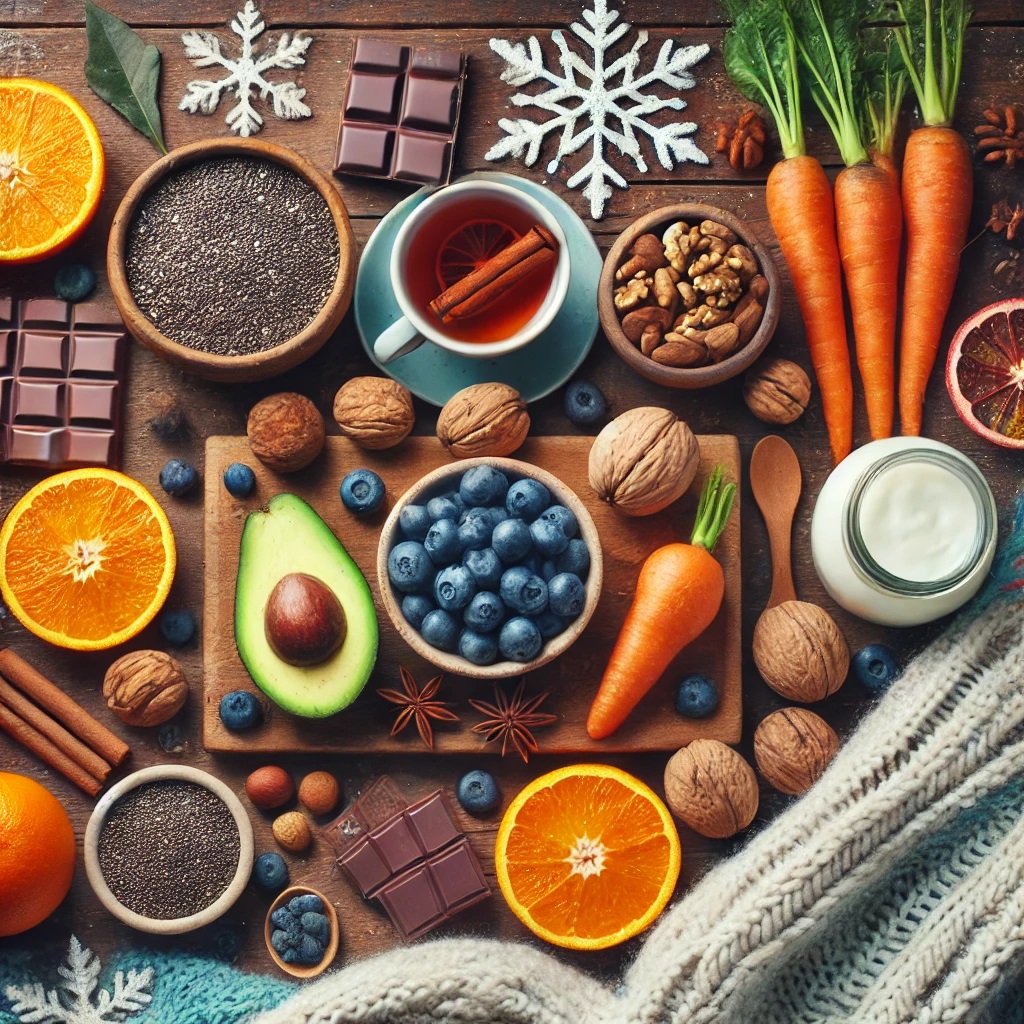What to Eat in Winters for Glowing Skin

What to Eat in Winters for Glowing Skin
Winter brings chilly winds, cozy sweaters, and unfortunately, dry, dull skin for many. As the temperature drops, our skin tends to lose moisture, making it more prone to dryness and irritation. While topical skincare is essential, what you eat plays a vital role in nourishing your skin from the inside out. Let’s explore the best winter foods for glowing, healthy skin, recommended by dermatologists.
1. Hydrating Foods to Beat Dryness
Winter dryness often results from decreased humidity. To maintain hydration:
- Cucumber and Water-Rich Veggies: Though they seem like summer staples, cucumbers, celery, and zucchini are packed with water and help maintain skin elasticity.
- Citrus Fruits: Oranges, grapefruits, and lemons are not only hydrating but also rich in Vitamin C, which boosts collagen production for firm, glowing skin.
2. Omega-3 Fatty Acids for Skin Barrier Health
Cold winds can strip your skin of its natural oils, leading to flaky and itchy skin. Foods rich in omega-3s can help reinforce your skin’s barrier.
- Fatty Fish: Salmon, mackerel, and sardines are excellent sources of omega-3s that reduce inflammation and improve skin hydration.
- Chia Seeds and Walnuts: If you’re vegetarian, these plant-based options provide essential fatty acids to keep your skin supple.
3. Vitamin A-Rich Foods for Skin Repair
Vitamin A is crucial for cell regeneration, which keeps your skin glowing even in harsh winters.
- Sweet Potatoes: Rich in beta-carotene, which converts to Vitamin A, sweet potatoes are a winter superfood for healthy skin.
- Carrots and Pumpkins: These vibrant orange vegetables promote a natural glow while improving skin texture.
4. Antioxidant-Packed Foods for a Natural Glow
Antioxidants combat free radicals that can damage your skin, especially in cold weather.
- Dark Chocolate: Packed with flavonoids, dark chocolate improves blood circulation, giving your skin a radiant glow.
- Berries: Blueberries, strawberries, and raspberries are rich in antioxidants that protect your skin and improve its tone.
5. Foods High in Vitamin E for Extra Protection
Vitamin E is a powerful antioxidant that prevents skin damage and keeps it hydrated.
- Almonds and Sunflower Seeds: These are excellent sources of Vitamin E and can be enjoyed as snacks or added to smoothies.
- Avocado: A winter favorite, avocado is rich in healthy fats and Vitamin E, making it a skin-nourishing delight.
6. Collagen-Boosting Foods for Elasticity
Collagen is the protein that keeps your skin plump and youthful. During winter, eating collagen-boosting foods can help maintain its elasticity.
- Bone Broth: This nutrient-dense broth is rich in collagen and amino acids that repair skin.
- Eggs: The amino acids in eggs help your body produce collagen naturally.
7. Hydration Through Warm Drinks
Winter can make us forget about drinking water, but staying hydrated is key for glowing skin.
- Herbal Teas: Chamomile, green tea, and peppermint tea not only keep you warm but also flush out toxins.
- Infused Water: Add slices of lemon, cucumber, or mint to your water for a hydrating boost.
8. Zinc and Selenium for Skin Healing
Zinc and selenium promote skin healing and protect it from harsh weather effects.
- Pumpkin Seeds: These small seeds pack a punch of zinc, which helps repair damaged skin.
- Brazil Nuts: A rich source of selenium, Brazil nuts improve skin elasticity and reduce inflammation.
9. Spices for a Winter Glow
Certain spices not only add flavor but also provide skin benefits.
- Turmeric: Its anti-inflammatory properties give you a natural glow. Add it to milk or soups for a golden treat.
- Cinnamon: Improves blood flow and boosts skin radiance; sprinkle it over your oatmeal or coffee.
10. Probiotics for Gut-Skin Connection
A healthy gut reflects on your skin. Winter is the perfect time to add probiotics to your diet.
- Yogurt and Kefir: These are great sources of probiotics that balance gut health and improve skin clarity.
- Fermented Foods: Kimchi, sauerkraut, and miso can improve skin conditions like eczema and dryness.
Final Thoughts
What you eat in winter has a direct impact on your skin’s health and glow. Focus on a diet rich in hydrating, antioxidant-packed, and nutrient-dense foods to keep your skin looking radiant and nourished throughout the season. While food is a powerful tool, combining it with a good skincare routine and staying hydrated will ensure your skin thrives even in the coldest months.
So this winter, make your plate colorful and nutritious, and let your glowing skin speak for itself!
Stay warm, stay hydrated, and stay glowing!
